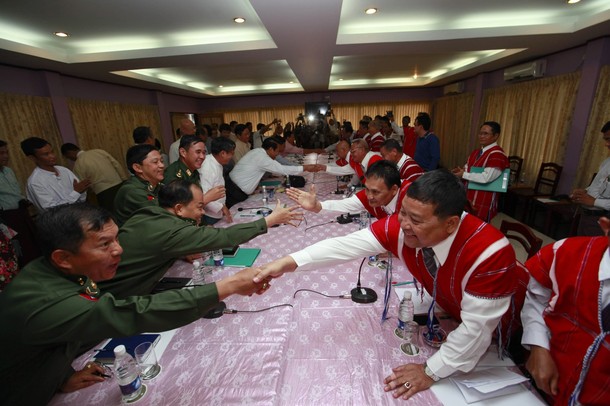The Karen National Union (KNU) is ready to sign a nationwide ceasefire agreement, according to one of its most prominent central executive committee members, Mahn Nyein Maung, who spoke to DVB in an interview on Monday.
“The KNU is looking to find solutions to all political issues through a nationwide ceasefire,” he said, adding that he envisages a “Panglong-like conference where representatives of the government, parliament, the Burmese armed forces, ethnic armed groups, political parties, civil society groups and women’s groups sit face to face to discuss political issues and amend the constitution.”
The KNU leader said that in a post-ceasefire world, all ethnic groups should be able to look for solutions to political issues based on federal principles.
Asked whether this meant that the Karen rebels – who have fought successive Burmese government forces for autonomy for over 60 years – have reached an accord on military issues, Mahn Nyein Maung said, “We have managed to establish a significant level of trust to an extent where I can say that we are now in a position to sign a nationwide ceasefire agreement.”
[related]
On 4 October, the Restoration Council of Shan State (RCSS – the political wing of the Shan State Army– South) released a statement in which it expressed optimism in participating in a nationwide ceasefire.
It noted however that the Burmese army had been responsible for 122 clashes during nearly two years of bilateral ceasefire, while the RCSS accepted that it had initiated only 11 military clashes. The Shan army’s statement called on the Burmese government forces to abide by the 31 terms of the ceasefire signed between both parties on 2 December 2012.
Meanwhile, Aung Naing Oo, the associate director of the Peace Dialogue Program at Myanmar Peace Centre, expressed hope that the ethnic armed groups which are still not ready to sign a ceasefire will continue with dialogue until the time is right for them to sign.
“Ultimately we would encourage all groups to sign,” he said.
However, Nai Hongsa, the United Nationalities Federal Council (UNFC) spokesperson and New Mon State Party general secretary, said he did not see why such a nationwide ceasefire was necessary.
“Some armed groups, even after signing ceasefires, have still been engaged in hundreds of military clashes with the Burmese army,” he said. “Therefore there should be a clear understanding about demarcation – a nationwide ceasefire should only be signed when this has been widely agreed.
“And reaching a ceasefire doesn’t mean the peace process is completed,” he said. “But rather it is a mechanism to facilitate political dialogue that, in turn, builds further understanding.”



